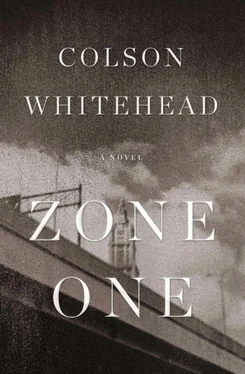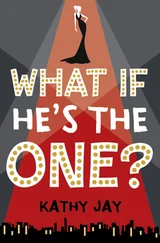The soldiers discussed work over dinner. While they sucked meat paste off the roof of their mouths, they pondered how every type of store and building cultivated its own rhythms and customs, kept likely suspects loitering by the checkout counters, the help desks, and You Are Here maps of subterranean midtown concourses. The health clubs in the basements of rental buildings catering to young singles commanded their regulars and habitués, and the faculty lounges of mammoth public high schools maintained their assortments ricocheting off the coffee-machine counter, as they had before the plague. The major fast-food purveyors became, over time, reliable for a certain kind of experience and the reasonably priced surf-and-turf chain offered its own fortifying menu as the dead city continued its business in mirthless parody.
One day they noticed the ebb. Impossible not to. The grotesque parades thinned. Slaughter slowed. The dead creaked forth in groups of a dozen, then five at a time, in pairs, and finally solo, taking their proper place atop the heaps of corpses as they were cut down. The soldiers steadied themselves atop the corpses in turn and drew a bead. They made hills. Putrefying mounds on the cobblestones of the crooked streets of the financial district. They rid the South Street Seaport of natives and tourists alike, and the breeze off the water carted away buckets of the stench. Snipers crosshaired on swaying silhouettes six, seven blocks crosstown, that sensible, age-old grid layout allowing passage for traffic that traveled at the speed of sound. As the numbers of the creatures thinned, the soldiers no longer offered themselves as lures. They hunted, ambled, leisurely, easygoing flaneurs drifting where the streets took them. The soldiers were the arrowhead of a global campaign and they understood it each time they overcame the resistance in the trigger, felt good about it. The soldiers took longer rest breaks, devising new branches of gallows humor, jokes that took root. They knew they were being fundamentally altered, in their very cells, inducted into a different class of trauma than the rest of the survivors. Semper fi. Then they went inside.
They dispensed with the superstructures one by one, the global headquarters brimming with junior VPs and heads of accounts, the great sinks of money and insurance, the public housing projects with their cinder-block labyrinths and denimed minotaurs, the middle-income megaplexes and prewar co-ops. They stormed the municipal buildings whose functions were engraved in great stone blocks over the entrance for easy identification. Initially surprised at how many skels they found ricocheting inside the government buildings, but it made sense once they thought about it. They landed on the roofs and rammed the stairwell doors, grateful for daylight whenever it penetrated. The most unexpected places pullulated with the things, for no reason they could fathom. Why this particular juice joint and not another, why this neighborhood greasy spoon, synagogue, bookstore, 99 cent store? Bas-reliefs of gryphons, sea serpents, and chimaeras coiled the length of the monumental old buildings, indicators of another era’s idea of craftsmanship and of what monsters might look like. The pulverized faces of the dead increased the zone’s percentage of faces that were less handsome than those of the cornice gargoyles. It had been a small number before the plague, despite the coteries of investment bankers.
The marines eliminated the outside stragglers, the ones standing on the sidelines as the dead made their implacable sallies. The street vendor at his rolling cart brandishing a small rod covered with caked, dry mustard. The skateboarder posing on the filigreed manhole cover at the bottom of his favorite declivity. The window-shopper bewitched before a boarded-up department-store window, taking in a long-removed display that nonetheless unfurled its exquisitely arranged baubles behind the plywood. Who knew what went on in what remained of their minds, what mirages they made of the world. The marines shot them in the head, harmless or no.
Some of the marines died. Some of them didn’t hear the warnings until too late for all the gunfire. Some of them lost their bearings in the macabre spectacle, drifting off into reveries of overidealized chapters of their former lives, and were overcome. Some of them were bit, losing baseballs of meat from their arms and legs. Some of them disappeared under hordes, maybe a glove sticking out, waving, and it was unclear if the hand was under the direction of the fallen soldier or if it was being jostled by the feasting. Funeral rites were abbreviated. They incinerated the bodies of their comrades with the rest of the dead.
They nozzled diesel into the bulldozers and dump trucks. The air filled with buzzing flies the way it had once been filled with the hydraulic whine of buses, the keening of emergency vehicles, strange chants into cell phones, high heels on sidewalk, the vast phantasmagorical orchestra of a living city. They loaded the dead. The rains washed the blood after a time. The New York City sewer system in its bleak centuries had suffered worse.
The marines were redeployed, some upstate to hasten completion of the northern initiatives, others to hush-hush engagements out West. Not many details apart from that. The army arrived, then the corps of engineers with plans for the next phase. They cradled the tubes of blueprints and schematics of the metropolitan systems under their armpits, bestowed upon them by Buffalo after excavation from some undisclosed climate-controlled government storehouse.
Any structure under twenty stories was left to the sweepers. Hence Mark Spitz. When his unit finished number 135, they were done with Duane x Church, Mixed Residential/Business. Then it was on to the next.
“Shouldn’t be too many hostiles,” Kaitlyn said. They started back up the stairs of 135 Duane. The sweepers gobbled and assimilated the military lingo into their systems with gusto. Mingled with the fresh slang, the new vocabulary of the disaster was their last-ditch armor plate. They tucked it under their fatigues, over their hearts, the holy verses that might catch the bullet.
Other phrases in vogue were less invigorating and uplifting: extinction, doomsday, end of the world. They lacked zing. They did not stir the masses from their poly-this poly-that inflatable mattresses to pledge their lives to reconstruction. Early in the reboot, Buffalo agreed on the wisdom of rebranding survival. They maintained a freakish menagerie of specialists up there, superior brains yanked from the camps, and what did these folks do all day but try and think up better ways to hone the future, tossing ideograms up on whiteboards and conferring at their self-segregated tables in the sublevel cafeteria, lowering their voices when outsiders walked by balancing orange trays. Some of them were hard at work crafting the new language, and they came up with more than a few winners; the enemy they faced would not succumb to psychological warfare, but that didn’t mean that the principles needed to remain unutilized.
It was a new day. Now, the people were no longer mere survivors, half-mad refugees, a pathetic, shit-flecked, traumatized herd, but the “American Phoenix.” The more popular diminutive pheenie had taken off in the settlements, which also endured their round of cosmetics, as Camp 14 was rechristened New Vista, and Roanoke became Bubbling Brooks. Mark Spitz’s first civilian camp was Happy Acres, and indeed everyone’s mood did brighten a bit on seeing that name on the gate next to the barbed wire and electric fencing. Mark Spitz thought the merchandise helped out a lot, too, the hoodies and sun visors and such. The frigid hues and brittle lines of the logo conformed to a very popular design trend in the months preceding Last Night, and it was almost as if the culture was picking up where it left off.
Читать дальше












